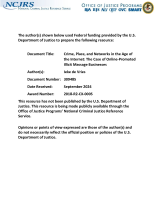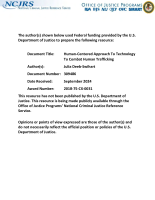Crime
Hybridization or Salad Bar Ideology? Testing Ideological Convergence Within the American Violent Far Right
Public Surveillance Cameras and Crime: The Impact of Different Camera Types on Crime and Clearances
Advancing Situational and Developmental Approaches To Prevent Sexual Violence
CHANGING DISTRIBUTION OF BIG-CITY CRIME - A MULTI-CITY TIME-SERIES ANALYSIS
SERIOUSNESS OF CRIMES - NORMATIVE STRUCTURE AND INDIVIDUAL DIFFERENCES
Race and Rationality Revisited: An Empirical Examination of Differential Travel Patterns to Acquire Drugs Across Geographic Contexts
ASSAULTIVE YOUTH - AN EXPLORATORY STUDY OF THE ASSAULTIVE EXPERIENCE AND ASSAULTIVE POTENTIAL OF CALIFORNIA YOUTH AUTHORITY WARDS
VICTIMIZATION AND PERCEPTION OF CRIME IN A GHETTO COMMUNITY
PROPERTY CRIME AND ECONOMIC BEHAVIOR - SOME EMPIRICAL RESULTS
ADEQUACY OF DIFFERENTIAL ASSOCIATION THEORY
Crime, Place, and Networks in the Age of the Internet: The Case of Online-Promoted Illicit Massage Businesses
Evaluation of the Chattanooga United to Reduce Violence (CURV) Initiative
REFRAME: Research and Evaluation Framework for Reducing hArm and Measuring the Effectiveness of CVIPI Strategies
Heal Our Youth: A Mixed Methods, Hybrid Effectiveness Implementation Trial for Reducing Community Violence Among Youth in Limited-Opportunity Settings
A Focused Deterrence Program for Juveniles with Firearm Offenses: a Randomized Controlled Trial and Process Evaluation
The Consequences and Impacts of Hate Crime and Post-Victimization Experiences: The Longitudinal Hate Crime Victimization Survey (LHCVS)
Fraud Narratives: The ecology of skepticism towards Latino immigrants
Assessing the Relationship between Immigration Status, Crime, Gang Affiliation, and Victimization
Addressing the Challenges of Drug-Facilitated Sexual Assault
Intent vs Impact: A Qualitative Investigation of Domestic Violence and Extreme Risk Protective Order Gun Prohibitions in Two States
Understanding the Impact of COVID-19 on Victim Services
The COVID-19 pandemic had a detrimental impact on communities across the nation and significantly affected various aspects of individuals’ lives. One of the negative impacts was an increase in gender-based violence accompanied by shifting barriers to accessing services and support. Victims and victim service providers faced various challenges dealing with the increase in need for services, navigating barriers to help-seeking, and addressing logistical issues.
See the YouTube Terms of Service and Google Privacy Policy




